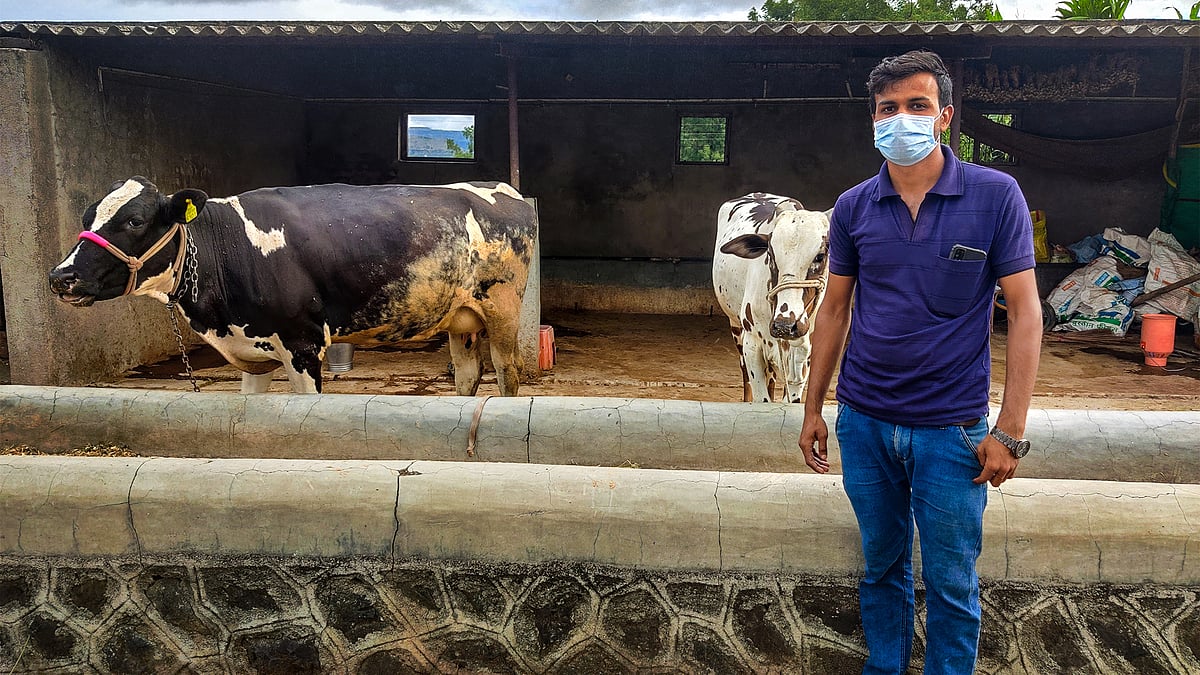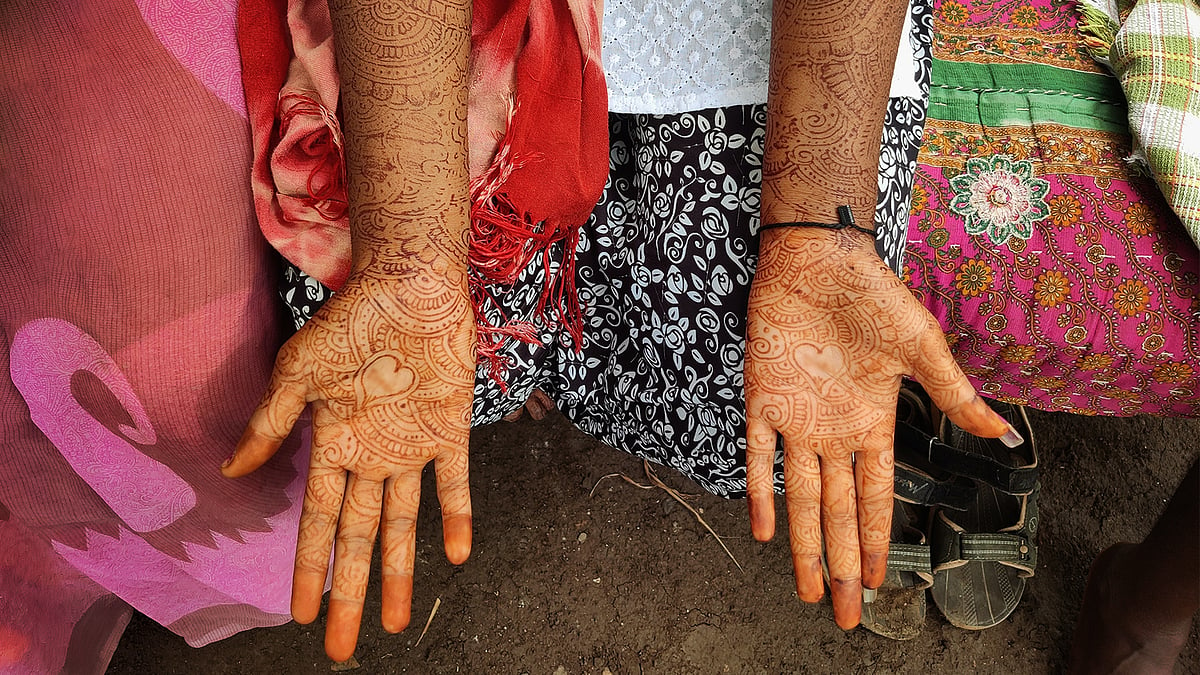Tomato virus and Covid lockdown slash farmer incomes in Maharashtra’s Ahmednagar
Tomato crates were sold at a fifth of the usual price this year, and many farmers have taken loans that they cannot repay.
“Two decades of cultivating these fields helped lay the foundation of this house,” said tomato farmer Bharat Navle, 43, gesturing at his two-storied white bungalow. “Now, just two years of loss might force me to sell it off.”
Vast expanses of lush farmland dot Agar Khanapur village in Maharashtra’s Ahmednagar district. The Akole taluka, under which this village falls, is famous for its profitable tomato farming and, as a consequence, fairly high-income group farmers. Tomatoes are cultivated on around 1,000 acres of farmland in Akole every year.
For the past year and a half, however, these fields have told a different story: of crop loss, price crashes, and compounding debt. All this is due to the double whammy of the nationwide lockdown last year to contain the spread of Covid, followed by a mysterious vegetable virus that ripped through the tomato fields, destroying close to half the harvest.
This year followed a similar pattern.
Bharat and his two brothers, Shivaji and Datta Navle, cultivate tomatoes on 15 acres of farmland every year, sowing in February and harvesting by April. Between them, they look after a family of nearly a dozen people.
This year, Bharat said, they’ve lost 50 percent of their harvest, while they lost 30 percent last year. Pacing the perimeter of their land, he pointed at alternate rows of tomato crops, indicating how it had been spoiled by the mysterious cucumber mosaic virus, or CMV, which hit their fields in early 2020.
Spread by insects called thrips, the virus is highly transmissible and causes discolouration and shrinkage in the tomato fruit. The brothers could not harvest any of the crops from the infected rows out of fear that it would spread across the entire field. Farmers told Newslaundry they believe the virus is a result of defective seeds from multinational seed companies like Syngenta and Seminis which, they say, the government won’t take action against.


Dr Krishna Reddy of the Indian Institute of Horticulture Research in Bengaluru had tested the samples of this virus in his laboratory last year. He told Newslaundry that there is no cure for this virus till date; it can either be prevented or suppressed. He said that insect vectors in this virus that attack the plant are more active in the summer cropping season, adding that the virus attacks the tomatoes between the planting and flowering stage.
Reddy said the virus is not new but has been active for five years now. Its spread only started multiplying in recent years, spreading to various parts of the state and outside.
“It is important for the farmers to understand that it is at this stage that they have to take precautions,” he said. “After that, even if the virus attacks, it won’t affect the yield.” He explained that it is also possible that the plant saplings that the farmers buy from local nurseries are already infected by the virus. Some of the precautions, he said, included spraying seven types of insecticide after planting and growing a wall of maize to protect the crop from the insects.
Some farmers said, however, that they had taken precautions but the virus still spread. They are now asking for a clear direction from the agriculture ministry whether or not to sow tomatoes in the summer season.
Lockdown destroyed market
After losing one half of their harvest, Bharat said, the remaining harvest was sold in the market this year at the lowest prices in the last two decades: Rs 4-5 per kg, or Rs 70-100 for a 23-kg crate, as opposed to their usual rate of Rs 400-500 per 23-kg crate.
Maharashtra’s largest tomato mandi in Sangamner, 23 km from Akole, was closed due to the lockdown in mid April, just when the summer harvest was ready to hit the market. It remained shut throughout May as well. So, outstation traders – who usually come to the mandi and buy the produce to sell it in Maharashtra, Gujarat, Chhattisgarh and Madhya Pradesh – did not arrive this year. Even the 200-odd permanent traders at the Sangamner mandi could not buy the produce.
“The mandi is the hub of marketing for us,” said Bharat’s brother Shivaji. “That is where the right price gets decided.”
A closed mandi means the collapse of the entire system of pricing in a healthy market, he explained. Instead, five or six traders came to the fields to buy their produce or organised the buying in illegal sheds during the lockdown. This handful of traders dictated the price.
Shivaji added that it takes an investment of Rs 1.5 lakh to cultivate an acre of tomatoes; this includes the cost of crop saplings, fertiliser, pesticides, mulch, labour and transportation. In a good year, their average earnings from 15 acres of cultivation is anywhere between Rs 25 lakh and Rs 50 lakh.
But now, the brothers won’t even recover the capital they put in. Shivaji said he expects to earn only Rs 4-5 lakh from their entire summer harvest this year. Pointing at stacked crates of smaller tomatoes, he said, “These might even be sold for free this year.”
The smaller tomatoes, colloquially called golti tomatoes, are of lower quality and comprise around 20-30 percent of the total crop every year. They are usually sold at half the price of the good harvest. “The good ones are only going at Rs 5 per kg,” Shivaji said. “So, you can imagine what will happen to these.”
A few kilometres from the brothers’ farm, near Akole’s Takali village, Sandeep Navle, 42, told a similar story.
Sandeep, who has grown tomatoes since the age of 14, leaned on his scooter as he spoke to us, overseeing farm labourers pick and load tomatoes into crates. He usually sells at least 2,500 23-kg crates of tomatoes by the first week of June. This year, he only sold 700-800 crates. His first batch of tomatoes was ready by May 10 but, he said, the handful of traders who bought them quoted prices “on a whim”.


“The traders made profits as they got good prices in cities,” Sandeep said. “We were the ones who faced the blow of Covid.” Until a couple of weeks ago, he was selling tomatoes at Rs 2 per kg, or Rs 50 per crate, with the transport costs for one crate being Rs 25.
Sandeep and his brother cultivate five acres of land every summer – three acres of tomatoes and two of marigolds – to look after their joint family of eight. They suffered heavy losses last year and this year.
“Tomatoes can’t lie around for more than a day after getting plucked,” he said, describing the perishable nature of the harvest. “So, whatever price we get, we send it off.” Last year, confronted by the alien nature of the lockdown and its related issues, he threw away 2,500-3,000 crates of tomatoes, not knowing what else to do with them.
Praveen Gosavi, the agriculture officer of Akole taluka, told Newslaundry that around 300 or 400 tomato farmers in the area faced similar issues.
“The lockdown has hit them badly,” Praveen said. “Tomatoes can either be sold in a day’s time or have to be thrown away.”
Beginning of a debt cycle
Sandeep told Newslaundry that he has not been able to recover his capital investment, let alone make a profit. He’s now pinning his hopes on the government.
Tomato farming is a costly affair, he explained, and the price crash during the lockdown has strengthened one of his long-standing demands: that tomatoes should have a fixed price in the market so farmers can at least break even.
Newslaundry reached out to Dadaji Bhuse, Maharashtra’s agriculture minister, to ask what efforts were being made to cushion the losses of tomato farmers.
Bhuse said a specific scheme for tomato farmers does not exist because “all farmers were affected by the lockdown”. As for alternative distribution systems in the absence of a market, he said the government is “trying” to ensure that the farmers’ produce directly reaches people’s homes.
Meanwhile, Sandeep took a loan of Rs 5 lakh to cultivate his fields this year, even as he was reeling from last year’s losses. He wants the government to waive their loan premiums for the lockdown months. “I am not keen on growing in the next season until all this trouble subsides,” he said.
Bharat, Shivaji and Datta also took a loan of Rs 15 lakh this season, since their battered earnings from last year were not enough to fund this year’s sowing.
“He has become half his size,” said Shivaji about Bharat, explaining that his brother is worried about repaying the loan. In a normal year, loans taken for sowing would be repaid as soon as selling ends. “But with no profits in sight this year,” Shivaji said, “we might have to take more loans to repay it.”
Many farmers like Shivaji prefer to take crop loans from private moneylenders, who offer up to Rs 1 lakh per acre as opposed to government and cooperative banks that only offer loans of Rs 25,000 per acre. But loans from private moneylenders come with high annual interest rates of 14 percent, so the compounding debt is a source of immense stress.
The worst-hit
As we walked through the village with Shivaji, we reached a small clearing where a family of four sorted through a pile of plucked tomatoes. They were separating the good fruits from the others and loading them into crates.
These farm labourers are called vatikars in Maharashtra. A family of four vatikars does not work on a daily wage basis; instead, they get one-third of the farmer’s profits at the end of a season of labour. This labour includes sowing, stringing the crops, spraying pesticides, and loading the harvest. Until the harvest is sold, the farmer gives them money for monthly expenses which is later deducted from their profit share.


“The way these two years have gone, vatikars haven’t even made the bare minimum,” Shivaji said. “In fact, they’re indebted to farmers.”
Govind Agawale, 40, told Newslaundry he’s been working as a vatikar for 15 years. Sitting on an inverted crate and fidgeting with discarded tomatoes, he said he works here with his wife, younger brother, and sister-in-law, staying in tin sheds provided by the farmer for the season and then migrating back to their home across the hills of Akole.
They earn Rs 50,000-1 lakh for an entire tomato season. But this is during a normal year.
“This year, I don’t think I will even be able to recover the monthly expenses,” Govind said. “The thought robs me of sleep every night.”
Govind’s sons Prakash, 12, and Chandrakant, 10, stay with them too, occasionally pitching in with farmwork. Due to the lockdown, they have not gone to school for a year and a half. This also means they did not receive the school’s midday meal, adding to Govind’s household expenses.
Due to his meagre earnings last year, Govind took loans worth Rs 50,000 from various sources. He expects to earn Rs 15,000-20,000 from farmwork this year but his expenses by the end of May have already crossed Rs 30,000. This means he’s already in debt, owing Shivaji Rs 10,000.
“People have not started calling yet, but eventually they will want their money back,” said Govind. “I don’t know where I will get it from.”
 Covid crash: Why rural Maharashtra's dairy farmers are out on the roads
Covid crash: Why rural Maharashtra's dairy farmers are out on the roads
 Covid distress quadrupled child marriages in Maharashtra's largest district
Covid distress quadrupled child marriages in Maharashtra's largest district
